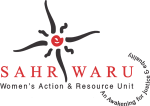Women in Governance
An effort has been made in previous years on the enhancing Women’s Political participation through Women’s Parliament.
It was a nationwide effort of NAWO (SAHR WARU is the western regional focal point of NAWO, and our Director Ms. Sheba George is the Joint Secretary); to bring forward potential women leaders from different, class, caste, and religious background to be Parliamentarians and conduct a Women’s Parliament which was held from 2nd – 5th November 2009 at New Delhi.
SAHR WARU had held this process in Gujarat and had prepared 21 Parliamentarians through district meetings, trainings and workshops to represent Gujarat in the National Front. Working on social inclusion, Peace and pluralism Gujarat represented leaders belonging to the Muslim community, Hindu Dalit, Christian Dalits, Tribals, and OBCs and general castes to bring forth overall issues of all communities residing in Gujarat.
The First Women’s Parliament successfully completed with about 500 women leaders had participated from all states of the Country.
Building Network on Muslim Women Leaders
While having built a strong network of Women Leaders in the Ahmedabad City, of women belonging to the Communities at the grass roots, we have held processes for a Network of Enlightened Muslim Women from around the country.
The network consists of Social Activists, Professors, Teachers, Lawyers, Doctors, Lawyers, Poets and Writers, IAS Officers.
A non-formal network called the National Alliance of Muslim Women was made in 2007 through a process of holding Regional Conferences in South, Central and Eastern Regions.
The Women shared their concerns and status of Muslim women and the community in their regions and expressed the need for Alliancing to work for their community.
Public Hearing
Followed by 2 successful public hearings held by the Organization: the first one in the year 2000 for the Muslim women, and the next in the year 2001 for Dalit women, we held our third hearing in December 2009 for women facing different forms of violence, discrimination, segregation and insecurity due to belonging to a particular community. A total of 350 participants were present from the local areas of Ahmedabad city – Naroda Patiya, Vatva, Bombay Hotel, Gomtipur, Ramol and Chandola. Participants had also came from 9 districts of Gujarat which included Mehsana, Sabarkantha, Kutch, Baroda, Bharuch, Navsari, Kheda, Anand, Dahod and Tapi, they included women from Dalit, Muslim and Tribal communities. Issues taken up in this hearing were : lack of implementation of government schemes, discrimination with Muslim minorities in all sectors, discrimination with the community in education, the status of Muslims in rehabilitation colonies, lack of basic rights, affect of SEZ (Special Economic Zones) affecting traditional occupations like fishing and farming, women and governance, affect on urban poor due to demolitions and excavations in the cities for beautification.

